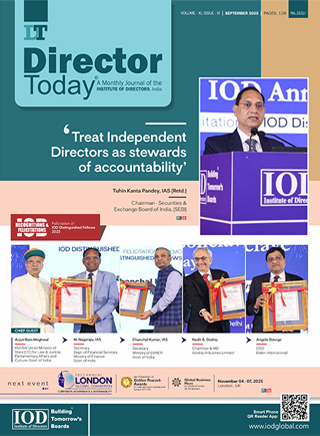Inclusive Leadership: Leading Diversity from the Boardroom

Board as a leader
There is always an ongoing debate about whether a good board 'manages' or only exercises 'effective oversight'. Managing the day-to-day affairs of the company is not what the board is constituted for; similarly, oversight without a definite direction can rarely be a game changer. The criteria that most concisely sums up an effective board is simple: does the board lead? Leadership is a quality rarely demonstrated by individuals and is even more difficult to find in a collective group. A board that leads is a remarkable cohort that inevitably adds value through its deliberations, guidance, and raised expectations.
Areas in which a board should take initiative cannot be precisely enumerated, as most are organisation specific. However, there are a few areas of focus that are recognised as relevant for all businesses. These mostly emphasis on revenue, growth, expansion, financial resource management, business strategy, and other financial parameters. It is an evolved board that can identify areas of emphasis beyond these and recognise that economic parameters would be positively impacted by a few initiatives that go beyond numbers. Diversity is one such important initiative that is increasingly being considered a value contributor capable of providing sizeable economic value and growth. It is a mature board that can rise above the daily din of the Internal Rate of Return (IRR) and systematically lead its organisation to foster a culture of diversity. The task is gradually becoming easier as more and more investors are demanding diversity as a covenant to their financing mandate.
Leading with diversity
Diversity has many facets. Most prominently evident are gender, background, competence, experience, and age. A variedly composed, diverse group that is homogeneous can reflect a multi-dimensional output of thought. An amalgamated group of diverse skills and sensibilities can ensure strategic thinking and enrich outcomes in organisations and boards. How an effective board achieves this diversity and sustains it constantly, within itself and in the organisation, is an important challenge to its leadership.
A board is mandated to reconcile the expectations of myriad stakeholders and protect different interests. It is therefore logical that first it needs to be diverse in its own composition and skill matrix. Members from different cultural, gender, and economic backgrounds can substantially enhance its deliberations and strategic outputs. The board selects and appoints its own members. Consequently, the role of the Nomination and Renumeration Committee (NRC) is significant in recommending various parameters of selection to the board; the job description should provide flexibility to look at diverse candidates beyond what clones the existing board composition. Equally significant is the consensus among the board members about the choice and identification of a candidate for a board position. Most boards tend to be more comfortable with a member who would 'fit in'. This is unlikely to incorporate diversity or challenge the existing mindset.
How and who a board includes as a new board member is a strong leadership signal to others in the company, including senior management. For example, most boards consider one woman-director as sufficient adherence to regulations and rarely seek to include more than one. Organisations understand these nuances, and their culture evolves accordingly. It is an interesting and powerful statute under the Companies Act mandates the board to decide its own composition, giving it a great opportunity to ensure its own diversity and lead by example!
Leading for diversity
For years, we have been asking for mindset change in diverse candidates; however, now it is increasingly desired that leaders within the organisation step up and create a facilitative organisational culture that creates equal opportunities for all employees. A wise board recognises that inclusiveness and diversity have to be embedded in the culture of an organisation; it demands diversity and leads to achieving it. All those associated with the organisation must be trained to consider diversity as an asset and champion it through their actions. Initially, the board needs to set targets and demand a strategy to increase the number of diverse participants. Cultural alignment being key to the sustainability of these initiatives, leaders continuously assess qualitative and quantitative aspects at different levels: recruitment, training, assignments, promotions, and career progression. Repeatedly, they assess whether diversity has been integrated into operations and decision-making, leading to a robust culture of parity and equity. Establishing and evaluating processes and structures are prerequisites that can enhance diversity and need constant attention and guidance.
Those who have the opportunity have the responsibility to speak for those who do not. The board, and particularly women members, should lead consciously, strategically, and vocally to bring diversity to the center stage of an organisation and demonstrate it through their actions in the boardroom.
Author

Ms. Neera Saggi
She has worked both in the Indian Administrative Service and in the private sector in leadership and entrepreneur positions. She has extensive experience, in different areas of businesses and of has worked with varied partners and stake holders. Currently, she chairs the interrise Roads INVIT Board and is Independent Director on the Board of GE Power India Ltd., T&D India Ltd., Honeywell Automation India Ltd., and Adani Green Energy Ltd.
Owned by: Institute of Directors, India
Disclaimer: The opinions expressed in the articles/ stories are the personal opinions of the author. IOD/ Editor is not responsible for the accuracy, completeness, suitability, or validity of any information in those articles. The information, facts or opinions expressed in the articles/ speeches do not reflect the views of IOD/ Editor and IOD/ Editor does not assume any responsibility or liability for the same.

 Quick Links
Quick Links
 Connect us
Connect us




 Back to Home
Back to Home































